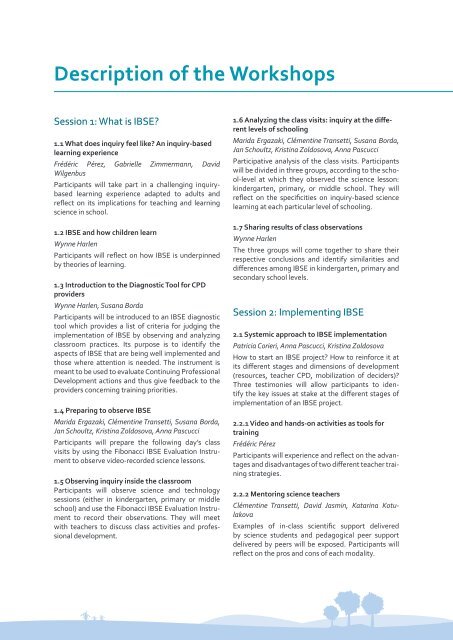deepening the understanding of inquiry in natural sciences
deepening the understanding of inquiry in natural sciences
deepening the understanding of inquiry in natural sciences
Create successful ePaper yourself
Turn your PDF publications into a flip-book with our unique Google optimized e-Paper software.
Description <strong>of</strong> <strong>the</strong> Workshops<br />
Session 1: What is IBSE?<br />
1.1 What does <strong><strong>in</strong>quiry</strong> feel like? An <strong><strong>in</strong>quiry</strong>-based<br />
learn<strong>in</strong>g experience<br />
Frédéric Pérez, Gabrielle Zimmermann, David<br />
Wilgenbus<br />
Participants will take part <strong>in</strong> a challeng<strong>in</strong>g <strong><strong>in</strong>quiry</strong>based<br />
learn<strong>in</strong>g experience adapted to adults and<br />
reflect on its implications for teach<strong>in</strong>g and learn<strong>in</strong>g<br />
science <strong>in</strong> school.<br />
1.2 IBSE and how children learn<br />
Wynne Harlen<br />
Participants will reflect on how IBSE is underp<strong>in</strong>ned<br />
by <strong>the</strong>ories <strong>of</strong> learn<strong>in</strong>g.<br />
1.3 Introduction to <strong>the</strong> Diagnostic Tool for CPD<br />
providers<br />
Wynne Harlen, Susana Borda<br />
Participants will be <strong>in</strong>troduced to an IBSE diagnostic<br />
tool which provides a list <strong>of</strong> criteria for judg<strong>in</strong>g <strong>the</strong><br />
implementation <strong>of</strong> IBSE by observ<strong>in</strong>g and analyz<strong>in</strong>g<br />
classroom practices. Its purpose is to identify <strong>the</strong><br />
aspects <strong>of</strong> IBSE that are be<strong>in</strong>g well implemented and<br />
those where attention is needed. The <strong>in</strong>strument is<br />
meant to be used to evaluate Cont<strong>in</strong>u<strong>in</strong>g Pr<strong>of</strong>essional<br />
Development actions and thus give feedback to <strong>the</strong><br />
providers concern<strong>in</strong>g tra<strong>in</strong><strong>in</strong>g priorities.<br />
1.4 Prepar<strong>in</strong>g to observe IBSE<br />
Marida Ergazaki, Clément<strong>in</strong>e Transetti, Susana Borda,<br />
Jan Schoultz, Krist<strong>in</strong>a Zoldosova, Anna Pascucci<br />
Participants will prepare <strong>the</strong> follow<strong>in</strong>g day’s class<br />
visits by us<strong>in</strong>g <strong>the</strong> Fibonacci IBSE Evaluation Instrument<br />
to observe video-recorded science lessons.<br />
1.5 Observ<strong>in</strong>g <strong><strong>in</strong>quiry</strong> <strong>in</strong>side <strong>the</strong> classroom<br />
Participants will observe science and technology<br />
sessions (ei<strong>the</strong>r <strong>in</strong> k<strong>in</strong>dergarten, primary or middle<br />
school) and use <strong>the</strong> Fibonacci IBSE Evaluation Instrument<br />
to record <strong>the</strong>ir observations. They will meet<br />
with teachers to discuss class activities and pr<strong>of</strong>essional<br />
development.<br />
1.6 Analyz<strong>in</strong>g <strong>the</strong> class visits: <strong><strong>in</strong>quiry</strong> at <strong>the</strong> different<br />
levels <strong>of</strong> school<strong>in</strong>g<br />
Marida Ergazaki, Clément<strong>in</strong>e Transetti, Susana Borda,<br />
Jan Schoultz, Krist<strong>in</strong>a Zoldosova, Anna Pascucci<br />
Participative analysis <strong>of</strong> <strong>the</strong> class visits. Participants<br />
will be divided <strong>in</strong> three groups, accord<strong>in</strong>g to <strong>the</strong> school-level<br />
at which <strong>the</strong>y observed <strong>the</strong> science lesson:<br />
k<strong>in</strong>dergarten, primary, or middle school. They will<br />
reflect on <strong>the</strong> specificities on <strong><strong>in</strong>quiry</strong>-based science<br />
learn<strong>in</strong>g at each particular level <strong>of</strong> school<strong>in</strong>g.<br />
1.7 Shar<strong>in</strong>g results <strong>of</strong> class observations<br />
Wynne Harlen<br />
The three groups will come toge<strong>the</strong>r to share <strong>the</strong>ir<br />
respective conclusions and identify similarities and<br />
differences among IBSE <strong>in</strong> k<strong>in</strong>dergarten, primary and<br />
secondary school levels.<br />
Session 2: Implement<strong>in</strong>g IBSE<br />
2.1 Systemic approach to IBSE implementation<br />
Patricia Corieri, Anna Pascucci, Krist<strong>in</strong>a Zoldosova<br />
How to start an IBSE project? How to re<strong>in</strong>force it at<br />
its different stages and dimensions <strong>of</strong> development<br />
(resources, teacher CPD, mobilization <strong>of</strong> deciders)?<br />
Three testimonies will allow participants to identify<br />
<strong>the</strong> key issues at stake at <strong>the</strong> different stages <strong>of</strong><br />
implementation <strong>of</strong> an IBSE project.<br />
2.2.1 Video and hands-on activities as tools for<br />
tra<strong>in</strong><strong>in</strong>g<br />
Frédéric Pérez<br />
Participants will experience and reflect on <strong>the</strong> advantages<br />
and disadvantages <strong>of</strong> two different teacher tra<strong>in</strong><strong>in</strong>g<br />
strategies.<br />
2.2.2 Mentor<strong>in</strong>g science teachers<br />
Clément<strong>in</strong>e Transetti, David Jasm<strong>in</strong>, Katar<strong>in</strong>a Kotulakova<br />
Examples <strong>of</strong> <strong>in</strong>-class scientific support delivered<br />
by science students and pedagogical peer support<br />
delivered by peers will be exposed. Participants will<br />
reflect on <strong>the</strong> pros and cons <strong>of</strong> each modality.


